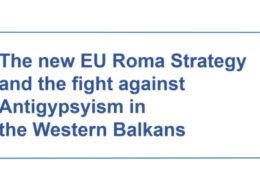Ahead of the EU-Western Balkans’ leaders meeting of 6 May 2020 (Zagreb Summit), the European Commission reaffirmed its commitment to the accession process and announced over €3.3 billion of EU financial support to the countries in the Western Balkans.
On a short-term, the Commission will assist the countries in the Western Balkans in their fight against COVID 19, but the core part is the proposed long-term “Economic and Investment Plan” for the region which will be further detailed in 2020.
The statements of representatives of the European Commission as well as from EU Member States refer to the importance of both the respect of fundamental rights and assistance of the most vulnerable communities. However, prior to the Zagreb Summit they neglected the situation of the Roma who are the most vulnerable and whose fundamental rights are the most threatened in the region.[1]
The reaffirmation of the commitment of the European Union in the context of the Zagreb Summit would be an excellent opportunity to ensure the Roma in the Western Balkans that they will also benefit from the envisaged measures to combat the short-term and long-term consequences of the COVID 19 crisis.
Moreover, the countries in the Western Balkans and the EU should seize the momentum and develop a new approach for the inclusion of Roma. Acknowledging the limited impact of the policy yet, the new approach should be based on combatting the institutional racism towards Roma, the antigypsyism, complementing the current focus on socio-economic approaches. Further, we consider it as important to have a stronger involvement of Romani civil society and more emphasis on empowering the communities. And it should promote access to quality vocational training and labour market.
The COVID 19 pandemic exposed the structural expressions of the antigypsyism and the failures of the current policies for the inclusion of Roma, despite 20 years of interventions and millions of Euro spent:
Many Roma are still confined into slum-like overcrowded neighbourhoods without access to infrastructure such as running water – making it more than difficult to follow the hygienic rules in COVID 19 times.
Roma aren’t being hired as employees in the public or private sector and they are forced into precarious self-employment, often as day-labourers, in many cases without health insurance or any other protection – making them more vulnerable and leaving them without income possibility.
Romani children often cannot follow online- or distance-learning due to lack of computers or internet access.
Yet, Roma were in particular hit by the COVID 10 crisis and their economic perspectives are bleak, since many of them have no sources of income anymore. Up to now, the supply with humanitarian packages for most of the Romani communities worked quite well – not at least thanks to the initiative and activities of the Romani civil society.
Despite the importance of providing humanitarian assistance, which has to continue, systemic solutions to improve the situation of Roma are necessary. This requires combatting antigypsyism and improving in parallel the socio-economic situation. Since experts expect a second or third wave of the virus and a severe economic crisis, the specific consequences of COVID 19 should be considered too.
It’s time for EU political leaders to make Roma equality an integral part of the EU accession process
The governments in the Western Balkans, the European Union as well as individual Member States have therefore, to include specific, targeted measures for Roma in the proposed “Economic and Investment Plan”.
Combatting antigypsyism in all parts of public life is indispensable. Further targeted measures should include upgrade programmes for Romani neighbourhoods in order to avoid that the current slum-like living conditions of many Roma poses a risk for many people also in future. They have to include programmes which promote the employment of Roma in order to break up the confinement in precarious self-employment. They have to include better access of children to online or distance-learning in order to avoid that many children will not finish schools.
The Commissioner for Neighbourhood and Enlargement, Olivér Várhelyi, stated that with this plan, the European Union tackles the “hard socio-economic impact of the crisis, to modernise the economies in the region, support the reforms and start closing the development gap, thus bringing concrete benefits to the people faster.”
The President of the European Commission, Ursula von der Leyen, emphasised the solidarity expressed with the commitment of the EU and the EU extends its solidarity to the refugees in the regions and is also providing immediate humanitarian assistance to vulnerable refugees and migrants amounting to EUR 4.5 million for protection, support to unaccompanied minors and health care.
If the European Commission is serious with the solidarity and with bringing concrete benefits to the people, it has to ensure in cooperation with the governments of the Western Balkans, individual Member States of the European Union and Romani civil society that Roma are included not only in the proposed “Economic and Investment Plan”, but can equally participate in the societies of the Western Balkans.
Further information and specific recommendations:
Joint CSO letter to Commissioner Várhelyi on May 5, 2020: Civil society letter addressing Roma equality as part of the EU accession process and the EU response to the Covid-19 pandemic
Joint CSO statement of March 31, 2020: Alarming situation of Roma communities in the Western Balkans and Turkey through the COVID-19 pandemic
Stephan Müller, Fikrija Tair, Bashkim Ibishi and Dragan Gracanin: ROMA: EUROPE’S NEGLECTED CORONAVIRUS VICTIMS
ERGO Network policy recommendations of April 30, 2020: The effects of Covid-19 on Roma communities in EU Member States and Enlargement and Neighbourhood Countries
Post-2020 Roma Policy Coalition statement of March 16, 2020: Towards a EU post-2020 Roma equality and inclusion policy; Civil Society response on the Roadmap of the European Commission
[1] European Commission (29 April 2020): Western Balkans’ leaders meeting: EU reinforces support to address COVID-19 crisis and outlines proposal for post-pandemic recovery https://ec.europa.eu/commission/presscorner/detail/en/ip_20_777




